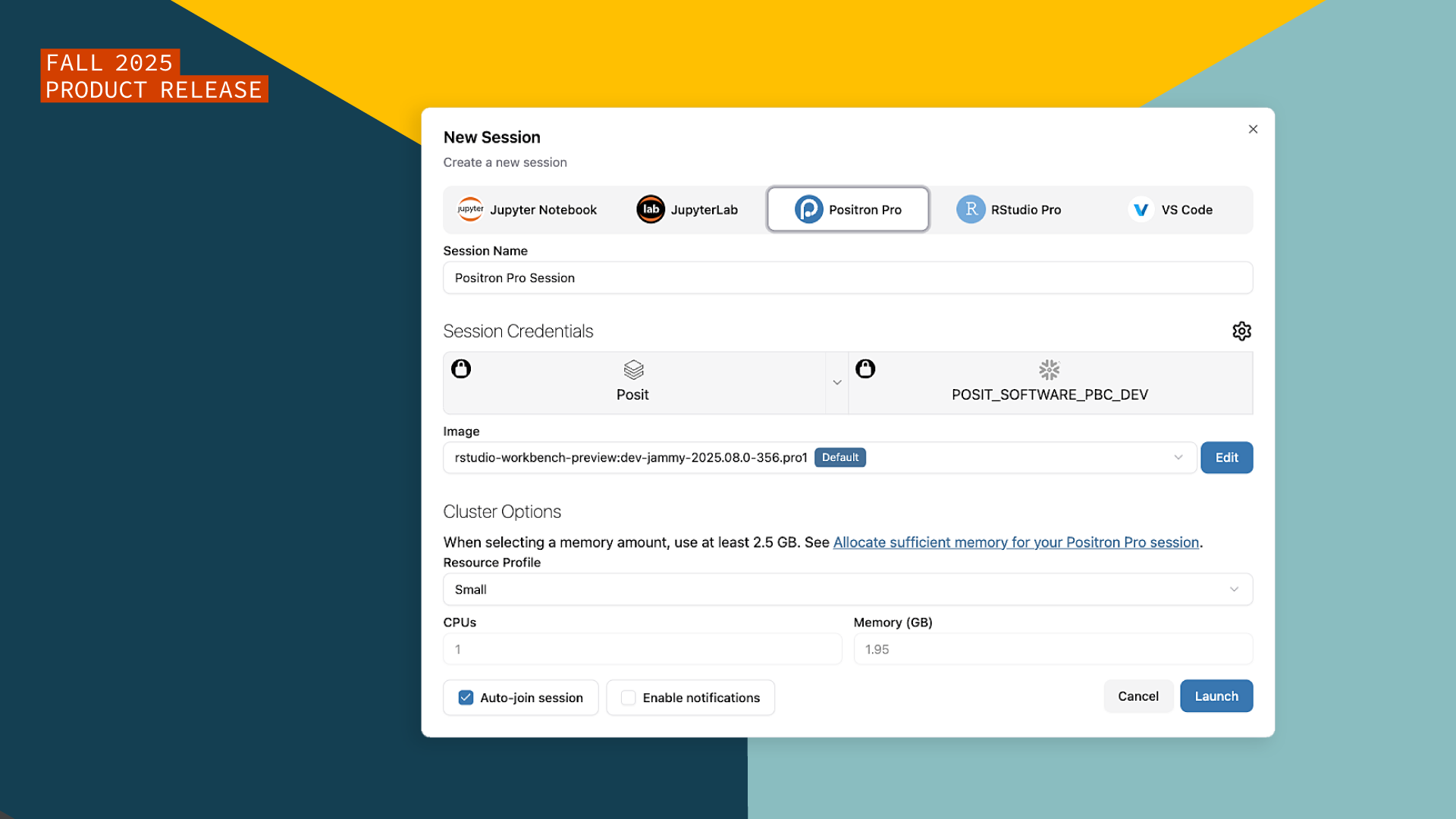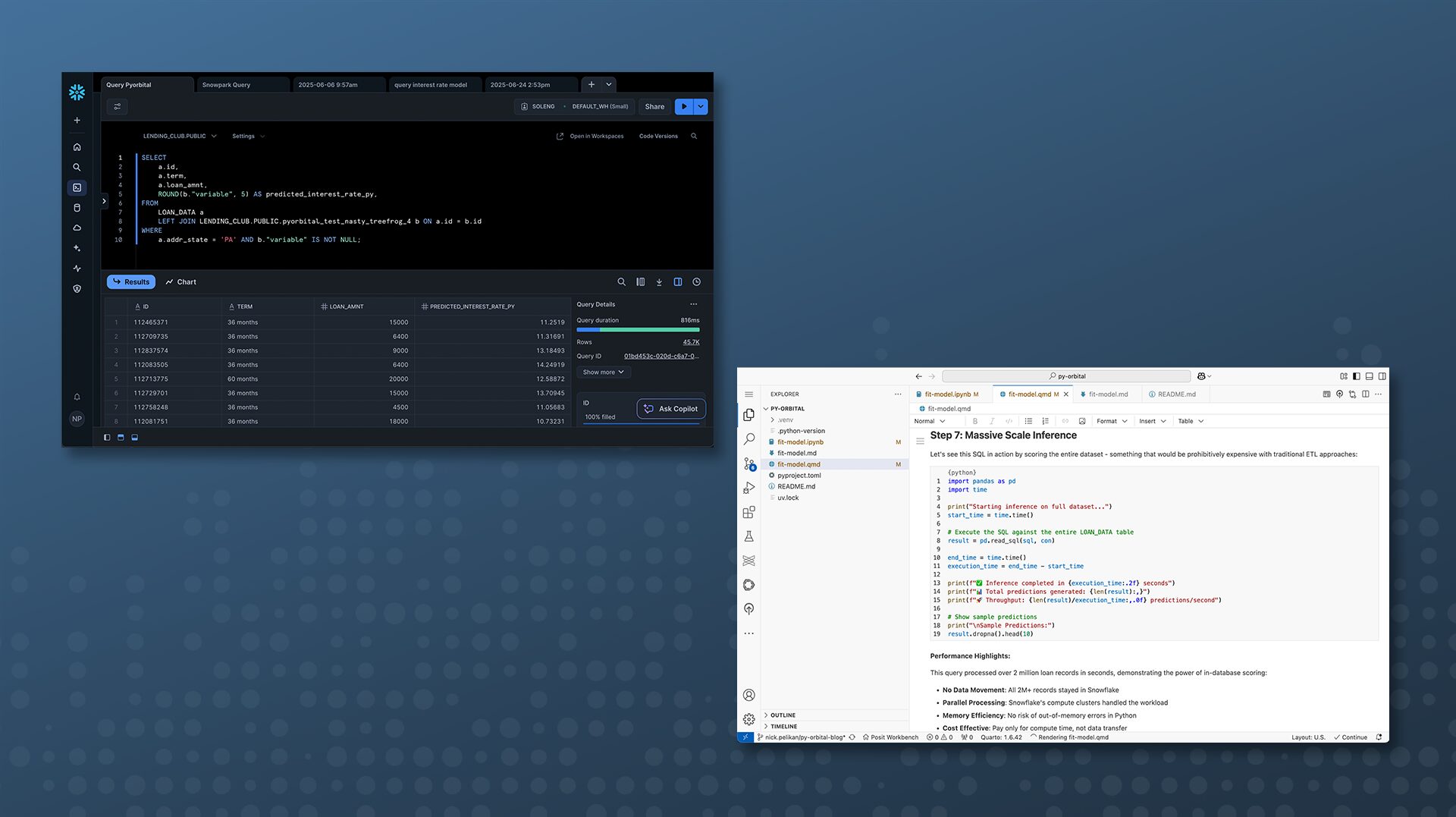Do data science better: Try Posit for Snowflake’s powerful new tools

Posit’s goal is to make it seamless for data scientists to turn data into insights, wherever that data lives. It provides the premier environment for analyzing data and building applications with R and Python. Snowflake excels at securely storing data and making data and AI models available. Thus, bringing Posit’s best-in-class data science tools directly into the Snowflake ecosystem unlocks tremendous value.
Today, we are happy to announce the latest capabilities from this powerful partnership.
Accelerate time-to-value with Positron
Data scientists work differently. So does Positron, Posit’s code editor made for data science and analysis with Python and R. Rapidly develop data apps by previewing Shiny, Streamlit, Dash, and other data apps directly in your IDE, right next to your code. And do it all within Snowflake: easily access the next-generation Positron IDE directly within the Posit Workbench Native App for Snowflake!

The Posit Workbench Native App runs directly within your Snowflake account using Snowpark Container Services. This means that the tools data scientists love – RStudio, VS Code, Jupyter, and now Positron – run entirely within your Snowflake account, right next to your data, inheriting Snowflake’s security, roles, and governance. This powerful partnership allows teams to boost their productivity and reduce operational burden.
But that’s not all: Positron also includes native AI capabilities for agentic code completion and exploratory data analysis. Ask Positron Assistant to help with your code, all with the right data-specific context. Additionally, Cortex model support for Positron Assistant is not available yet, but coming soon.

Want to learn more about Positron? Register for the What’s New webinar.
Enabling easy, secure development in Snowflake
Posit has developed open-source packages specifically designed to enhance your Snowflake workflows. Packages like dbplyr allow you to write familiar dplyr code in R that gets translated into SQL for execution directly within Snowflake. More recently, orbital lets you translate tidymodels workflows into native SQL, allowing predictions to run blazing fast inside Snowflake. The Python version of orbital does the same thing for Scikit-Learn models.

Is it possible to have a seamless and secure AI assistant for R-based data science? One that knows that you are trying to analyze data (not develop software), and that tailors its suggestions accordingly? Yes, it is!
When used from within Snowflake (in the Posit Workbench Native App), Posit’s open-source AI tools like Gander integrate with Snowflake Cortex to bring secure, context-aware AI assistance directly into your IDE. Sensitive AI data remains securely within Snowflake and will never be shared with the wrong users. querychat provides a simple framework for building Snowflake-powered AI chat interfaces directly into R and Python dashboards.
Always connected to the right data
As discussed above, Posit Workbench integrates with Snowflake’s Snowpark Container Services to offer developers familiar environments like RStudio and VS Code – all with seamless access to Snowflake data.
Additionally, Posit Connect enhances data sharing with Snowflake’s security and governance features to enable granular, viewer-level permissions. Regardless of where you host Posit Workbench or Posit Connect, you can securely access your Snowflake data from R or Python, using Posit’s professional drivers, ODBC Connections, or the Snowflake Python Connector. This makes it easy to query and use data stored in Snowflake from your favorite IDE or data visualization framework. Flexibly connect your existing, self-hosted Posit tools to data in Snowflake.
Customer Story: How a Leading Automobile Services Company Accelerated Model Development to Optimize Marketing Spend
A leading automobile services company faced many challenges with its existing data science environment, primarily centered around performance bottlenecks and platform limitations:
- Slow, Manual Model Execution: Running propensity models in their legacy environment took an exorbitant amount of time (20 to 24 hours per model)
- Processing Bottlenecks: ETL and data aggregation jobs for models competed for resources with other critical processes, leading to collisions and administrative overhead.
- Limited Iteration: The lengthy model execution time restricted data scientists from running model updates frequently (annually or semi-annually), limiting their ability to quickly incorporate new data

To solve these issues, they partnered with Posit and Snowflake to leverage the Posit Workbench Native App running on Snowpark Container Services:
- Integrated Environment: By deploying their data science environment using the Posit Workbench Native App on Snowflake, the team seamlessly combined Posit’s powerful data science tooling with Snowflake’s scalable compute and storage capabilities.
- In-Database Processing (Orbital): The team used the orbital package to convert model outputs (coefficients) into SQL code, pushing the scoring process down into Snowflake’s highly performant engine.
The results highlighted in the box on the right showcase the dramatic improvements this team has experienced.
Join us and learn more
We can’t wait to show you how these new features can power your workflows and help you win in the new age of data science.
- Join us on August 27, 2025, at 12 pm ET for a live customer webinar to learn more about all of these capabilities, how they can transform your business, and how you can take advantage of them right away.
- Visit us at posit::conf Sept 16-18. Learn, grow, and connect with a global community of data scientists at our annual data science conference.
- Schedule a demo with us.
- Upgrade and get going!
